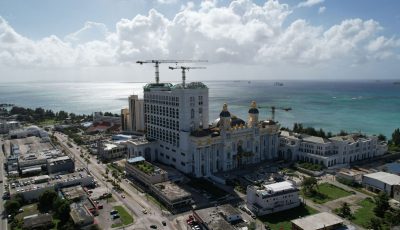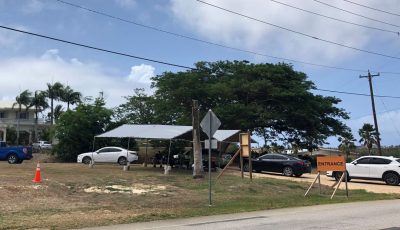Businesses, Chamber against sugar tax
Tax will negatively impact industry
Residents and businesses on island along with the Saipan Chamber of Commerce are against a pending legislation adding taxes on sugar-sweetened beverages and sugar-sweetened concentrates.
A couple of weeks ago, the Senate Committee on Health and Welfare passed House Bill 19-99 HD4, SD1 which seeks to “assess a health impact tax on sugar-sweetened beverages and sugar-sweetened concentrate, for the prevention of non-communicable diseases in the CNMI; to create a Special Healthcare Impact Act.”
With the substantial amendments done by the Senate committee including the changes in appropriation, the legislation will now go back to the House.
Since the beginning, the Chamber has opposed the bill introduced by Reps. Felicidad Ogumoro (R-Saipan) and Angel Demapan (R-Saipan).
In a position paper sent to Ogumoro last October, SCC and its Government Relations Committee stated that they are “not in favor” of HB 19-99.
“While a Special Healthcare Impact Account may seem a worthwhile idea, it will not fix the substantial needs of our island’s only hospital. The Chamber urges the government to return to operating the hospital again, and to help subsidize the medical care provided at the hospital for island residents,” SCC said.
A succeeding position paper last month stressed further that they are “strongly opposed to this bill” adding that it would substantially increase the cost of not only soda drinks, but also carbonated fruit juices, iced teas, and other products.
“We believe that the way to change consumer behavior is to educate, not to penalize. Our island has a significant low-income population and this effect of this bill will take more of their meager income for the cost of everyday needs. These beverages are not the only foods that are unhealthy for consumption. Will other food products also become subject to tax?” SCC said.
“The SCC believes that this bill reaches too far into regulating personal consumption, and hope that the legislators find alternatives that will educate the public on good food choices and on healthier lifestyles,” it added.
The Chamber has forwarded the same position papers to Gov. Ralph DLG Torres last week since they have not received notification regarding further development on the bill.
MARPAC resident manager Guy Pudney echoes this sentiment saying that they weren’t given enough access to comment on the bill.
“There was a hearing held at the House back in February that nobody knew about not even the Chamber of Commerce. We usually receive all of our notices through the Chamber and then we were prepared to go to the Senate on April 13 because that’s when we heard the hearing would be but it turns out that the Senate reviewed the bill on the 6th instead of the 13th. We weren’t notified that the Senate would hear the bill on the 6th,” Pudney said.
Increase in prices, burdening consumers
Pudney said the bill will negatively impact their business.
“It would pretty much wipe out any Aloha and Royal Mills Ice Coffee business that we currently have. After factoring in the new tax, a can of Aloha would cost a consumer $1.60 a can from $0.85 and a can of Ice Coffee would now cost $2.00 per can versus what was $1.15,” Pudney said.
“We see this bill as being too ‘excessive’ as far as wanting to collect $.04 per ounce or roughly $11.52 per case in excise tax. That’s not including the $1.20 per case in container tax and the beautification and gross receipts tax that we have to pay as well,” he added.
Likewise, Bello A. Lumintegar of Western Sales Trading Company says they are not happy with the proposed law as it would affect their non-alcoholic beverages such as Shasta Cola brand, Rockstar, and Xing Tea. Although these types of products just make up a small percentage of their entire line, Lumintegar said it will have an impact on their business.
“The current rate of these kinds of products is at 0.005 cent per fluid ounce and it will add 0.04 cent per fluid ounce. So it will increase to 700 percent. Therefore, if the said proposed bill will become into law, it will have a huge impact on our pricing,” Lumintegar said.
Concerned citizen Glen Hunter, who, several years ago also served as manager of the distributors of Pepsi and Coca-Cola on island, said that the increase for the cost of a can of soda will be “astronomical” should the bill passes.
A 12-ounce can of soda, which can be bought at $0.17 from a plant, will be taxed at $0.48 on sugar tax alone as the bill currently proposes $0.04 per fluid ounce.
This is on top of the existing Soft Drink Tax—a $0.005 per fluid ounce—which translates roughly to $0.006 per can, container tax which is $0.05 per container, and shipping cost which is roughly $0.15 per can, Hunter said.
“That’s astronomical. Even if you add the tax and the shipping and everything, its almost still double the amount of the new sugar tax,” Hunter said.
Hunter said the sugar-sweetened beverages will be taxed “more than anything in the whole island that’s ever been taxed” and that the Legislature will be “taxing it more than anyone in the world has taxed SSBs.”
“If you look at it strictly from the principle that this is a legal commodity, this is not a restricted commodity…they’re treating it something worse than alcohol and cigarette,” Hunter said.
“It sets a terrible precedent. It’s just really a terrible way to legislate. What else or what next will they tax on an astronomical level? Will they decide tomorrow to do the same thing to rice, to canned goods? These are contributors to obesity and diabetes,” he added.
The American Beverage Association, an organization, which has members such as Coca-Cola Company and PepsiCo, also stated that the tax is “huge.”
“All this tax does is drive up grocery prices, making it more expensive to live and work in the Northern Mariana Islands,” ABA said, “This beverage tax proposal would be an enormous burden to our local businesses.”
“Adding a new tax on common grocery items like beverages means higher costs at the checkout counter—not to mention higher restaurant, vending machine, and concession stand costs. A tax like that would burden shoppers and businesses alike, putting many jobs at risk and doing untold damage to local businesses like neighborhood grocery stores and convenience stores,” it added.
Layoff workers, close businesses
Pudney went as far saying they would need to lay-off workers should the bill passes and that it will affect the local market.
“If this were to happen we would most likely have to layoff a few workers,” Pudney said.
“What’s going to happen is another ‘Black Market’ will be created. People and businesses would automatically profit by either smuggling in soft drinks and by purchasing from AAFES at $10 per case and then reselling to local stores. Everyone will still be consuming soft drinks but it would only be soft drinks not purchased from the local market,” he added, “I believe some local jobs would be lost and the soft drink sales would still be there but just going to a “non-taxed” entity.”
ABA stated Mexico as an example where 1,700 direct jobs were lost in the their soft drink industry and an estimated 7,500 from the industry’s value chain due to their own tax on sugar-sweetened drinks and on certain caloric food products.
“More than 30,000 small Mom & Pop or convenience stores in Mexico closed last year due to this tax and lack of safety and security, resulting in the loss of 50,000 jobs,” ABA said.
Overstep
ABA and the businesses said that a tax alone won’t make people healthier.
“This beverage tax is an overstep: We should be free to make our own food and beverage choices without our government telling us what we should and should not eat,” ABA said.
“A beverage tax will not teach children healthy lifestyles or change anyone’s behavior. The bottom line is that a tax won’t make anyone healthier—it will just make government even bigger. Politicians need to focus on priorities like education, jobs, and the economy and leave the grocery shopping to us,” it added.
“I don’t think this is the right way. I believe education and exercise would be the right avenue,” Pudney said.
Hunter said the legislation does more to harm than to help as it creates animosity by trying to be a “parent figure” telling the people what to do.
“They’re trying to force people to make healthy choices instead of allowing people to come to those realizations themselves through education, through an organic choice,” Hunter said.
Revisit other taxes
Pudney said the government should revisit the existing tax on soft drinks where the CNMI has generated more than $800,000 last year.
“What they should do is go back into that law and reprogram the funding and allocate some of that money toward the hospital and some toward education,” Pudney said.
Citing the Senate committee report which stated that $6.8 million will be collected on soft drinks alone on the proposed sugar tax and whose amendments focused mainly on appropriations, Hunter said the Legislature was focused on the money the government will be collecting rather than lessening the public’s consumption of SSBs.
“They’re not even taking into account any drop in SSBs,” Hunter said, “I think what has happened is they’re all focused on the dollar that will be generated and losing focus on the end goal which is creating a healthy atmosphere in the CNMI.”
Hunter, who has long voiced the need for the Legislature to tax the casino industry, reiterated that a casino tax would make more revenue than a sugar tax.
Taxing the casino, he said, would generate 10 times in three months what they hope to generate from the sugar tax in a year.
“They’re looking at adding fees to businesses, charges, adding taxes to legal consumer goods. This Legislature continues to add fees and taxation to the common people and to the businesses to this island while a newly formed industry, the casino industry, which is traditionally highly taxed, is untaxed in the CNMI,” Hunter said.
He added that the Legislature is trying to “cover their butts” by using sugar tax as the revenue forecast for next year has only a fractional difference from this year despite the casino coming on board.
“They need to stop sitting on their butts and stop indulging the casino moguls. They need to do what’s right for the people and they need to tax the casino,” Hunter said.



























